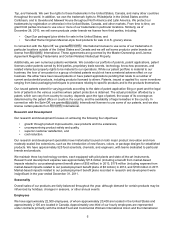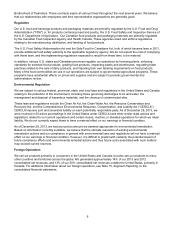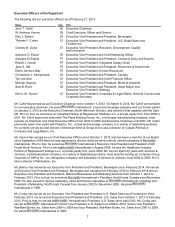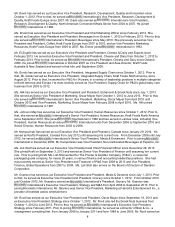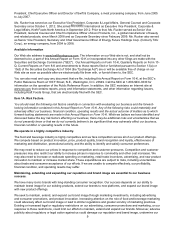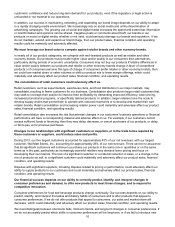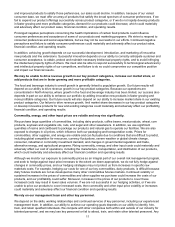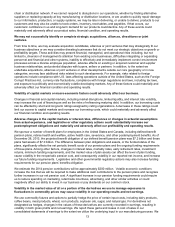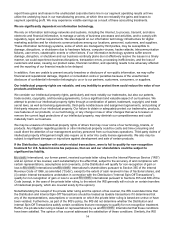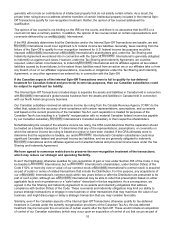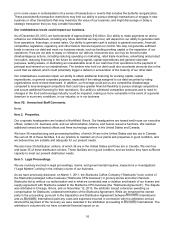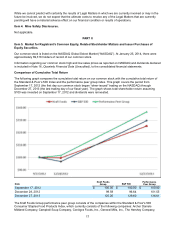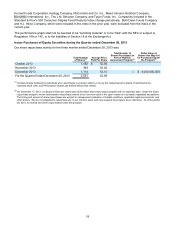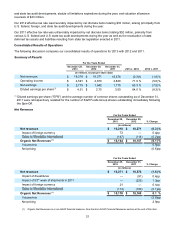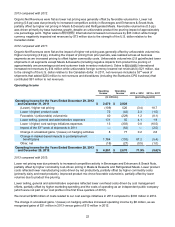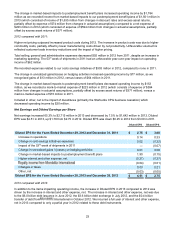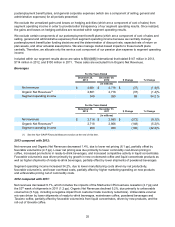Kraft 2013 Annual Report Download - page 17
Download and view the complete annual report
Please find page 17 of the 2013 Kraft annual report below. You can navigate through the pages in the report by either clicking on the pages listed below, or by using the keyword search tool below to find specific information within the annual report.
15
generally will not rule on contributions of intellectual property that do not satisfy certain criteria. As a result, the
private letter ruling does not address whether transfers of certain intellectual property included in the Internal Spin-
Off Transactions qualify for non-recognition treatment. Rather, the opinion of tax counsel addressed the
qualification.
The opinion of tax counsel is not binding on the IRS nor the courts, and there is no assurance that the IRS or a
court will not take a contrary position. In addition, the opinion of tax counsel relied on certain representations and
covenants delivered by us and International.
If the IRS ultimately determines that the Distribution and/or the Internal Spin-Off Transactions are taxable, we and
International could incur significant U.S. federal income tax liabilities. Generally, taxes resulting from the
failure of the Spin-Off to qualify for non-recognition treatment for U.S. federal income tax purposes would be
imposed on International or International’s shareholders and, under the Tax Sharing and
Indemnity Agreement we entered into in connection with the Spin-Off, International is generally obligated
to indemnify us against such taxes. However, under the Tax Sharing and Indemnity Agreement, we could be
required, under certain circumstances, to indemnify International and its affiliates against all tax-related
liabilities caused by those failures, to the extent those liabilities result from an action we or our affiliates take or from
any breach of our or our affiliates’ representations, covenants or obligations under the Tax Sharing and Indemnity
Agreement, or any other agreement we entered into in connection with the Spin-Off.
If the Canadian aspects of the Internal Spin-Off Transactions were to fail to qualify for tax-deferred
treatment for Canadian federal and provincial income tax purposes, then our Canadian subsidiaries could
be subject to significant tax liability.
The Internal Spin-Off Transactions included steps to separate the assets and liabilities in Canada held in connection
with International’s global snacks business from the assets and liabilities in Canada held in connection
with our North American grocery business.
Our Canadian subsidiary received an advance income tax ruling from the Canada Revenue Agency (“CRA”) to the
effect that, subject to the accuracy of and compliance with certain representations, assumptions, and covenants
and based on the current provisions of the Canadian Tax Act, such separation is treated for purposes of the
Canadian Tax Act as resulting in a “butterfly” reorganization with no material Canadian federal income tax payable
by our Canadian subsidiary, International’s Canadian subsidiary or their respective shareholders.
Notwithstanding the receipt of the advance income tax ruling, the CRA could determine that the separation should
be treated as a taxable transaction if it determines that any of the representations, assumptions, or covenants on
which the advance income tax ruling is based are untrue or have been violated. If the CRA ultimately were to
determine that the separation is taxable, our and/or International’s Canadian subsidiaries could incur
significant Canadian federal and provincial income tax liabilities, and we are generally obligated to indemnify
International and its affiliates against such Canadian federal and provincial income taxes under the Tax
Sharing and Indemnity Agreement.
We have agreed to numerous restrictions to preserve the non-recognition treatment of the transactions,
which may reduce our strategic and operating flexibility.
Even if the Distribution otherwise qualifies for non-recognition of gain or loss under Section 355 of the Code, it may
be taxable to International, but not International’s shareholders, under Section 355(e) of the
Code if 50% or more (by vote or value) of our common stock or International’s common stock is acquired
as part of a plan or series of related transactions that include the Distribution. For this purpose, any acquisitions of
our or International’s common stock within two years before or after the Distribution are presumed to be
part of such a plan, although we or International may be able to rebut that presumption based on either
applicable facts and circumstances or a “safe harbor” described in the tax regulations. As a consequence, we
agreed in the Tax Sharing and Indemnity Agreement to covenants and indemnity obligations that address
compliance with Section 355(e) of the Code. These covenants and indemnity obligations may limit our ability to
pursue strategic transactions or engage in new business or other transactions that may maximize the value of our
business, and might discourage or delay a strategic transaction that you may consider favorable.
Similarly, even if the Canadian aspects of the Internal Spin-Off Transactions otherwise qualify for tax-deferred
treatment in Canada under the butterfly reorganization provisions of the Canadian Tax Act, this tax-deferred
treatment may be lost upon the occurrence of certain events after the Spin-Off. These would include an acquisition
of control of our Canadian subsidiary (which may occur upon an acquisition of control of us) that occurs as part of


